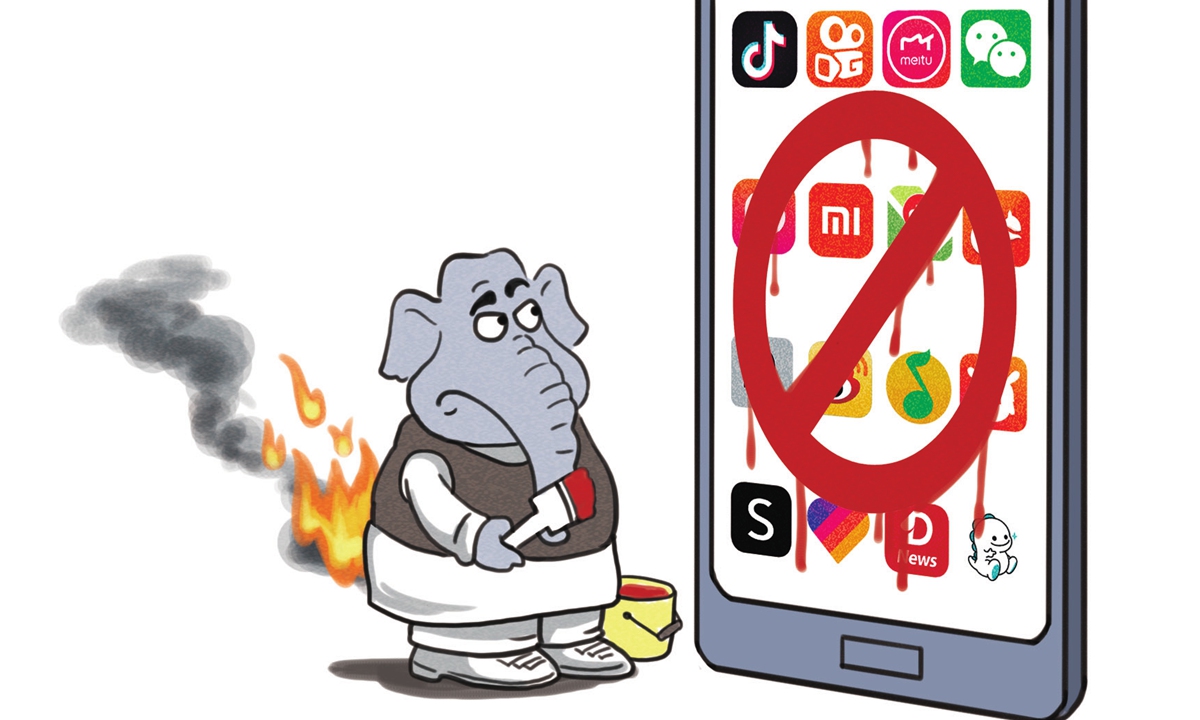India’s app ban follows US tech paranoia

Illustration: Liu Rui/GT
India made permanent a ban imposed in June 2020 on 59 Chinese apps including TikTok, Baidu, WeChat and UC Browser. The decision was made after India reviewed responses from companies on issues such as compliance and privacy, Reuters reported on Tuesday.Since the border clashes with China in May 2020, India had cited national security as an excuse to ban a total of 267 Chinese apps.
These moves clearly violate the market principles and WTO rules, and seriously infringe upon Chinese companies' legitimate interests. It is hoped that India can assure a fair, just, and nondiscriminatory environment for businesses from different countries, including China.
Essentially, New Delhi should correct its wrongful moves.
For the sake of maintaining the overall beneficial China-India relationship for the sound development of the two countries' economic and trade ties, Beijing has not yet taken any countermeasures against the above-mentioned actions of New Delhi.
The Chinese apps on New Delhi's ban list have been in operation in India for years. How could they suddenly begin to impose a security threat to India since 2020 - particularly after the border clashes? Obviously, the rise of anti-China sentiments in India following the clashes is the origin of the alleged threat to its national security.
Imitating policies of former US president Donald Trump, New Delhi has been trying to decouple from China economically. In addition to banning Chinese apps, the Indian government also instigated a wave of boycotts against China within India.
However, India is not the US. Its moves may harm Chinese companies, but cannot hurt the Chinese economy. India has shot itself in the foot.
National security is the highest priority for any sovereign country, which is way more important than economic interests alone. No country would sacrifice its national security for economic benefits. If relevant Chinese apps had jeopardized Indian national security, New Delhi should provide solid evidence to prove its ban has a legal basis. Unfortunately, the Indian side has not yet unveiled any proof in this regard.
Venture capital investment from China has promoted Indian internet industry's prosperity in recent years. There is a lot of room for cooperation between the two countries in this field. Some Indians believe these banned apps can be easily replaced by those of its own and of other countries. But if other countries learn from India's approach, the international ecology of the internet industry and the global market environment will be harmed. The worldwide web will become local networks with national border as boundaries. In that case, India's internet industry will hardly be able to succeed abroad.
India's unwise move will make Chinese enterprises think twice about the Indian government's ability to really abide by international law. Nor would these firms take India's claims of openness and transparency seriously. Other countries are also taking note of India's bad business behavior.
In particular, arbitrarily targeting Chinese enterprises with national security excuses will undoubtedly make Chinese investors more aware of the risks of doing business in India. This will surely lower their willingness to invest in the country. It will also hamper companies in other countries that have close links with China in the industrial chain from making investments in India.
The Trump administration launched strategic crackdowns on China and waged a trade war and a tech war to suppress China's high-tech companies. It also attempted to restructure the global industrial chain, urging US and other foreign companies to move out of China. Seeing this as an opportunity, India has swiftly moved closer to the US, with a hope that enterprises that leave China will be transferred to India. The COVID-19 outbreak in China at the beginning of 2020 even made many Indians believe it was the time for India to replace China as the world's factory.
But to the great surprise (and disappointment to some extent) of many in the Western world and in India, China has successfully put the epidemic under control while the US and India have become the top two worst-hit countries by the virus in the world in terms of total numbers of infections and deaths. China was the only economy to achieve positive economic growth in 2020, and had attracted the most foreign direct investments, with $163 billion of inflows. In contrast, both the US and India have witnessed negative economic growth.
India regards China as a major competitor and its biggest threat. It plans to gain benefits by cooperating with the US in containing China. However, large countries like China and the US, and even India cannot be easily contained or defeated by external forces. Joint containment by the US and India cannot crush China. If India wants to succeed, it should, first of all, do a good job with its domestic reforms and solve its internal problems to improve its own competitiveness. Otherwise, the opportunities lost by any other country can never be transformed into chances for a global Indian success story.
The author is a senior research fellow with the Academy of Regional and Global Governance at the Beijing Foreign Studies University and president of the Chengdu Institute of World Affairs. opinion@globaltimes.com.cn




